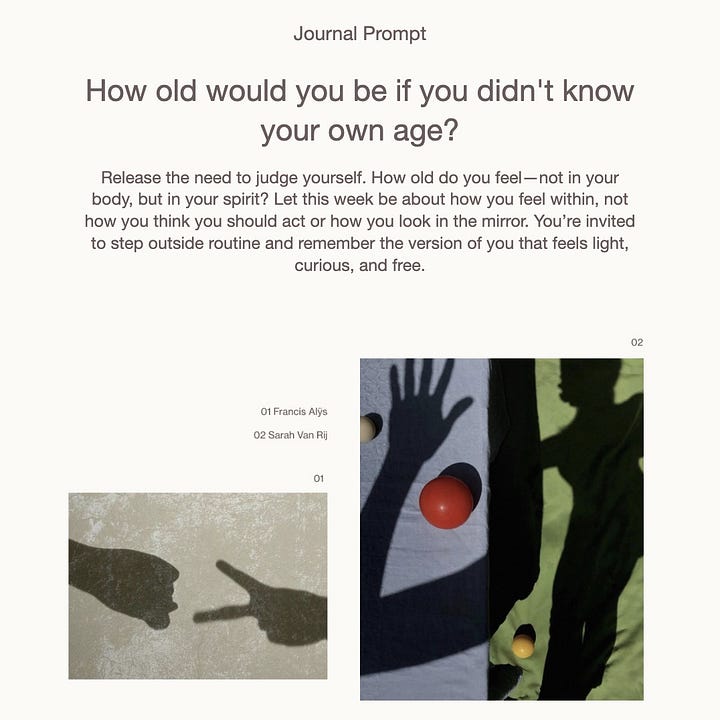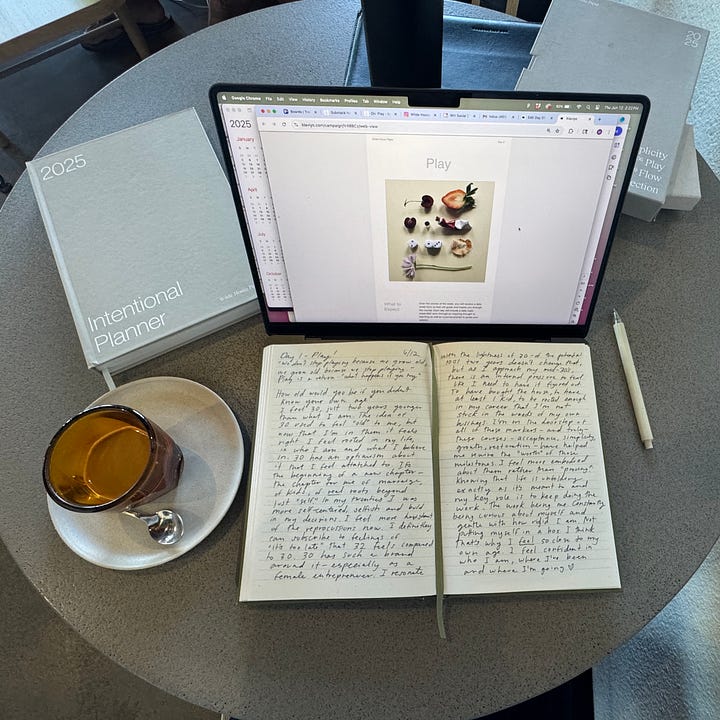How old would you be if you didn’t know your age?
Why play isn’t just for kids—and what it means to return to the most honest version of yourself.
Day 01 of the Play course gently challenges the belief so many of us carry—that we’re too old to play. That joy has an expiration date, or that wild, unfiltered fun is something only children get to access. But play isn’t something we outgrow—it’s something we forget. This course begins with a remembrance: that play is a return. A return to the version of ourselves untouched by judgment, timelines, or the pressure to be “enough.” It’s an invitation to meet ourselves again—before we learned to filter, to shrink, to wait.
Our relationship with age is complex, especially as women. We’re taught to chase youth while simultaneously being told to grow up, to plan, to settle. Age becomes tied to expectation—to looking younger, doing more, being further along. And in that pursuit, we often quiet the part of us that still wants to laugh loudly, explore freely, and express without self-consciousness. Play begins to feel frivolous, even indulgent. But I’m realizing it’s actually the medicine. The thing that softens all the pressure and reminds us who we were before the world told us who to be. I look forward to aging into someone who holds other people’s expectations less tightly—but even now, I’m asking: what am I waiting for? What would it take to let go now, and choose to be my full, messy, joy-filled self? I believe this course will help us uncover that answer—not through doing more, but through remembering what’s always been there.
Here’s my response to Day 01–
Prompt: How old would you be if you didn’t know you’re own age?
I feel 30, which is just two years younger than my actual age—but it feels like the age I most identify with. There's something about 30 that carries a sense of optimism, like the start of a new chapter. It feels like a threshold into something more rooted—into marriage, kids, and definitely a deeper understanding of who I am and what I believe in. Compared to the boldness of my twenties, where I felt more self-centered and limitless, 30 feels like a more grounded, intentional version of me. I think more about the risk because I have more responsibility.
And yet, even with that groundedness, I still carry the lightness of 20—the potential, the freedom. What’s changed is that as I approach my mid-thirties, there’s this quiet pressure to have it all figured out. To hit certain markers: buying a house, having kids, the career stability. I know I’m standing on the doorstep of those milestones, which holds more peace than it has for me in the past. I think what’s shifted from pressure to peace is that this year I’ve been consciously releasing measuring my worth by those milestone. Truly, through the insights that have come through these courses—acceptance, simplicity, growth, restoration—I’ve come to see life as something unfolding, not something to chase. I feel close to my age not because I’ve arrived, but because I’m finally okay with becoming. I feel confident in who I am, where I’ve been, and where I’m headed.


Notes:
• This is the most excited I’ve felt for a course in a while. Every course holds its own meaning, but this one carries a certain energy—one that I can feel moving through our community already. So many of you have shared how deeply it’s resonating, and I couldn’t feel more connected to you in that.
• If you’re keeping up with my world travels, I’m currently back home in San Diego—and honestly, the little comforts have been everything. Strolling through Sprouts and grabbing my favorite snacks, having a weeknight dinner with my sister, or stopping by In-N-Out on my way home from this coffee shop... it’s been grounding in a way I didn’t realize I needed. There’s something about returning to the familiar that mirrors what this course is asking of us: to come back to ourselves, to what feels good, to what feels like home.
• I love everything Ayushi writes, and today’s linked essay is no exception. What stayed with me most was the moment she has her first play date with her inner child and instinctively reaches for an old sketch pad. Her realization—that play isn’t transactional, and that the more she leaned in, the more she reconnected with a version of herself who created without judgment or the need for success—moved me. It’s such a powerful reminder that the joy we’re seeking often lives in the places we’ve stopped giving ourselves permission to return to.
• The meditation at the end of today’s linked article is incredibly powerful—I highly recommend taking five quiet minutes to do the visualization they guide you through. It’s simple but profound. These small moments of pause are exactly what will help you begin to remember, layer by layer, as we move through this course together.
I’m so curious to hear your response to Day 01’s prompt: What age do you feel?
I have a feeling this question is going to spark some really meaningful reflections and unexpected connections. I’d love to hear what came up for you—share your thoughts in the comments below!






I hadn't journaled in a while before sitting down to prompt 1 today. I really struggled with the May theme of Restoration. It even made me angry to think about rest (I'm sure that means nothing ...). At the start of June - no MID june, I'm starting to crave some rest so may return to that series after Play.
I wrote that I feel 45, which is 6 years older than I am. I wrote about all of the responsibilities and titles (mama, scholar) that feel quite heavy and restrictive, even if I love what they mean for me. The Milk and Cookies substack post about the inner child really resonates and I'm excited to see how the rest of this course unfolds for me, but I think it's going to involve playing music again. And leaving work at work.